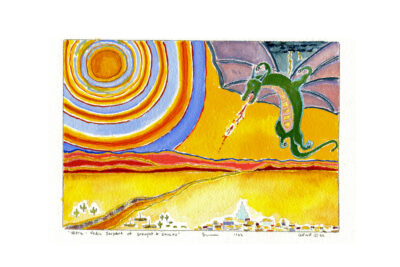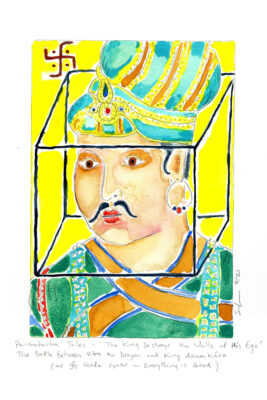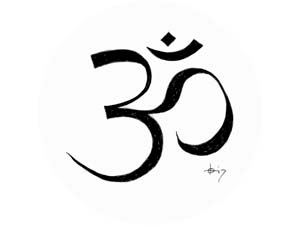A tale in Hindu mythology
Tale by Nivedita Yohana

Vritra is a Vedic serpent or dragon in Hinduism, the personification of drought and adversary of Indra (king of the highest heaven).
Vritra is identified as an Asura[2]. Vritra is also known in the Vedas as Ahi (“snake”).
Vritra appears as a dragon blocking the course of the rivers and is heroically slain by Indra.
According to the Rig Veda, Vritra kept the waters of the world captive until he was killed by Indra, who destroyed all the ninety-nine fortresses of Vritra before liberating the imprisoned rivers.[1]
The King and the Dragon
There was once a king by the name Ahaṃkāra in a kingdom all prosperous and well flourishing. He had qualities befitting his name as he was a very proud and a conceited king. He held supreme power and he ruled the kingdom with absolute discipline.
Under his rule, the kingdom was known as unconquerable as whoever tried to invade it was mercilessly defeated.
The citizens of the kingdom were governed with a firm hand under the watchful eyes of the soldiers and the ministers of the king’s court. They abided by the laws of the land and were self-reliant as they earned their own daily bread. No one could oppose the king or pose a threat to the kingdom.
After all, with the kingdom so abounding in wealth and prosperity and protected from enemies, what was there to complain about?
King Ahaṃkāra was consumed by his accomplishments

The king ― although successfully ruled the kingdom and protected the citizens from external forces ― was consumed by his accomplishments.
Success had gotten into his head and he was obsessed with material gains. As an egoist, he was not concerned about the sick and the needy and that was the cause of misery amongst many citizens.
In the kingdom where sickness and ailments were seen as a weakness and a curse, the king did not provide any relief or cure to the ill people. He rather allowed the nature to take its course and the sick were left to die.
One day, a poor woman came to king Ahaṃkāra and pleaded,
“My King, I am suffering and I need your help. I have been sick and unable to work. Kindly give me some food to recover my health so that I can start earning my own bread again.”
The king flatly refused her request and said,
“The kingdom does not need any sick people as they are not beneficial to the kingdom.”
He ordered the woman to be taken to a hill and be left there alone to die. The woman, filled with rage, cursed the king before taken out of the court,
“Oh! Foolish king! May my death awaken Vritra who brings famine and drought to the kingdom.”
A severe famine followed by severe drought
A few days later, the king heard that the poor woman had died. From that day on there was no rain in the kingdom, there came a severe famine followed by heavy drought. The dying woman’s curse had come true.
Once fertile soil got parched, crops that were once growing in abundance were withering away due to scorching heat of the sun. Men, women and children were dying of heat stroke; water was scarce. The rivers ran dry as Vritra had held the rivers captive under his fortresses.
The king realized his folly when his own pregnant wife, Queen Vidheya, fell sick due to dehydration. He was overcome with guilt and was remorseful seeing all the death and suffering caused by a curse of the poor woman who he had refused to help.
The king had to destroy the walls of his own ego
With a contrite heart, he decided to reinstate peace and prosperity back in the kingdom by defeating Vritra from whom he had to liberate the imprisoned rivers.
Before liberating the life-giving river to flow again in full glory and abundance, the king first had to go through the grueling process of destroying the walls of his own ego.
The king tackled each and every wall of his ego fort, a symbolical representation of the fortresses of Vritra.
Resolved to win, the king killed Vritra, destroyed his fortress and liberated the rivers to flow once again.
A valuable lesson in humility and kindness
Peace was restored in the kingdom and king had learnt a valuable lesson in humility and kindness. He then changed his name from Ahaṃkāra to Parivarthana suggesting that he was a reformed king.
Then onwards, king Parivarthana dedicated himself to the needs and happiness of the citizens, not just material success, and ruled the kingdom for many more years. He also taught the same values to his son, thus creating generations of kings rooted in dharma (truth).
Moral: Without kindness and humility, material success can come crashing down.
- Hanuman Strongman (04/28/17) Vritra ― The Evil Serpent of the Hindu Pantheon. Retrieved July 31, 2020 from https://aminoapps.com/c/mythology/page/blog/vritra-the-evil-serpent-of-the-hindu-pantheon/jLDQ_LJtKuVmEMMMwYYolLg7Qlkjm0KDMv …
- Anonymous (2013) HYMN XVIII. In The Rig Veda. Translated by Griffith, R.T. Digireads.com Publishing
Notes
[1] Hanuman Strongman (04/28/17) Vritra ― The Evil Serpent of the Hindu Pantheon. Retrieved July 31, 2020 from https://aminoapps.com/c/mythology/page/blog/vritra-the-evil-serpent-of-the-hindu-pantheon/jLDQ_LJtKuVmEMMMwYYolLg7Qlkjm0KDMv …
[2] Asuras are described in Indian texts as powerful superhuman demigods with good or bad qualities.






